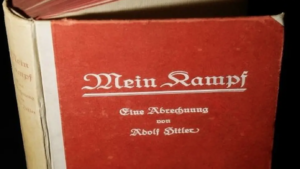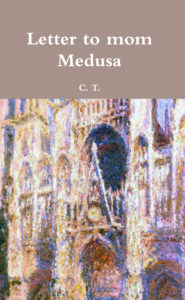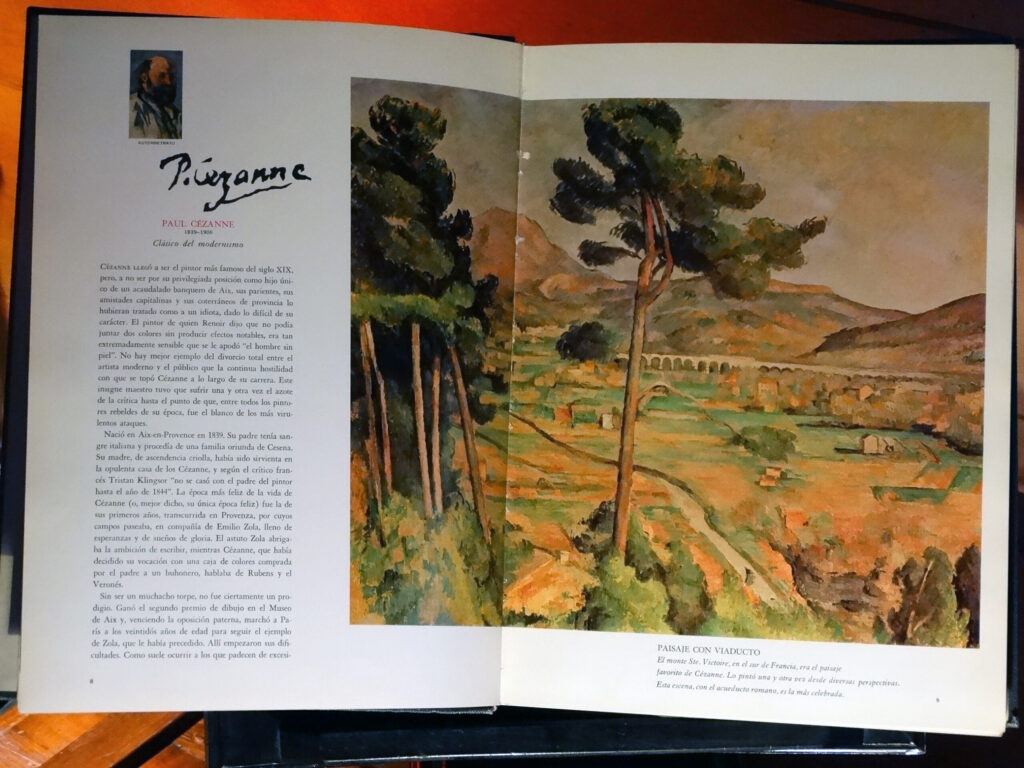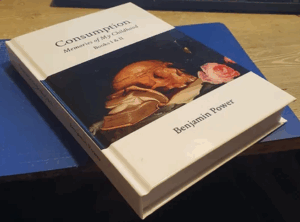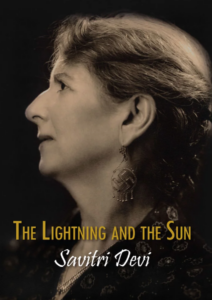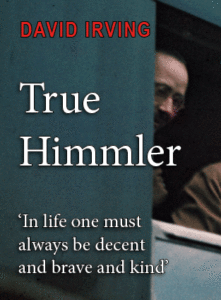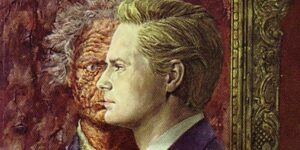Editor’s note:
I have said that understanding individual psychoses might provide the key to understanding the folie en masse, also called “mass formation”, which currently affects virtually all Westerners. In short, if a child named Ben is treated like shit by his parents, schoolmates and even mental health professionals throughout his formative years when his brain is still malleable, his inner self will internalise it (“I am Evil”) and, out of self-hatred, he will self-harm. I am oversimplifying an extremely complex process of erosion of the inner self that takes years, but that’s basically what it is.
The point I am trying to make is that this can also be done to an entire society. If, since 1945, virtually every Westerner has been brainwashed with propaganda that paints the Nazis in the blackest possible light, over time millions of Aryans will internalise the propaganda with such violence (“we whites are Evil”) that their ethnosuicide will become as natural as self-harming. That is why to save the West it is so crucial to un-demonise Hitler: the goal of this website.
Today, as I was resuming the reading of Benjamin’s book, I had to pause because of a serious episode of self-harm when he used to go to school, so much so that his parents had to take him to the hospital in an emergency. I tend to faint at graphic descriptions of blood, to the extent that I cannot watch images of surgeries in operating theatres. So I felt dizzy while reading chapter 18 of Consumption and I had to stop immediately to tidy my room (I am using a new wardrobe that the carpenter built for me yesterday and today) before continuing with my reading.
Remember that I was born in a place where half a millennium ago millions of Indians still practised ritual self-harm. If studying the Mesoamerican world is shocking, even more shocking is the absolute stubbornness of family members, friends, loved ones, and even mental health professionals in grasping the most basic fact: the problem of millions of children like Ben has been purely existential, not biomedical.
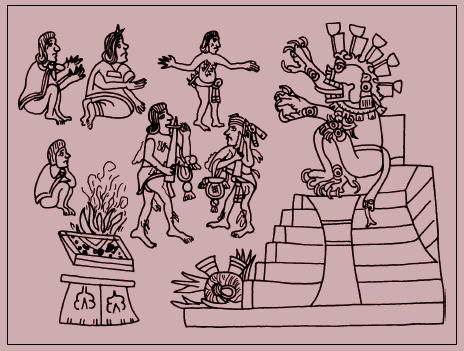
Priests performing a ritual of self-harming with bone awls (Codex Tudela, drawing by Fernando Carrizosa).
The Mesoamerican Indians belonged to a lower psychoclass than the Iberian conquerors. But that doesn’t mean that these conquerors were already the overmen Hitler dreamed of. Compared to him, the 16th-century Spanish and Portuguese belonged to a lower psychoclass. So the criticism that a conquistador might make of the psychologically dissociated indigenous people can also be made by me of the contemporary Westerner, insofar as I have developed more empathy than most of them. Otherwise the average Westerner would understand boys like Ben (see my Day of Wrath to better understand the concept of psychoclasses: it has to do with the historical development of empathy in a process that Lloyd deMause calls psychogenesis).
The boy Ben, for example, should have been helped with the most basic empathy, but that could only have been done by a “helping witness” (I explained that concept by Alice Miller a few posts ago). In a case like Benjamin’s, it was as surrealistically idiotic to treat his body with antidepressants as, say, prescribing Prozac to you if your child has been kidnapped and no one wants to help you rescue her!
It seems unbelievable but in this crazy world that is basically how psychiatry works!, although there are notable psychiatrists who have detected the madness of their profession and have dedicated their lives to debunking it. Although I am not one of them, I contributed to this debunking with my original article on the “irrefutable hypothesis” in biological psychiatry: a violation of the principle of falsifiability devised by Karl Popper to distinguish between science and pseudoscience.
Benjamin wrote:
______ 卐 ______
Chapter Eighteen
By the summer of 2001, my overt depression had not lifted. In the house, Dad was increasingly bad-tempered. As with Gerald, he could not understand why I would not pull together, seeing as I had been awarded my tablets by the psychiatrist, which I would still take daily. More and more, I would be tearful and morose, and more and more, he would become snappy with me or overbearing, criticising my choice of fashion or that I had not changed my clothes often enough and excessively reminding me to do my homework, even as I struggled to get homework finished in good time, and frequently left it until the last moment (though in English and Philosophy, I was still top of the class and received steady A-grade marks).
In Philosophy I would learn about Socrates’ moral and ethical dialogues and the theory of virtue and knowledge in the pursuit of eudaimonia (happiness), the epistemology of Plato and his theory of Forms, and Aristotle’s teleological causes and his works on the soul, followed by the writings of Thomas Aquinas and his arguments for the existence of God, moving on into John Locke’s evaluation of the self, David Hume’s empiricism and the theory of compatibilism the takes causal determinism as fully compatible with human free will, the metaphysical idealism of Bishop Berkeley and the mind-body dualism of René Descartes, the utilitarianism of Jeremy Bentham and John Stuart Mill, and then Immanuel Kant’s categorical imperative and his distinguishing between phenomena and noumena, and Arthur Schopenhauer’s transcendental idealism and the arguments on morality, finishing with Richard Swinburne’s substance dualism and Christian apologetics, and Gottfried Wilhelm Leibnitz’ theory of the best of all possible worlds, addressing theodicy, the problem of the existence of evil.
My mind was filled with complicated philosophical ideas, dwelling on ethics, good and evil, and ways to define and delineate the world around me, and indeed myself. My study of English literature complemented this intensity with an evaluation of the Romantic poets Coleridge, Shelley, Byron, Blake and Keats, with an emphasis on contemplations of nature, imagination, and the sublime, and an often-melancholic display of open emotion weaved through beautiful natural world similes and metaphors for the changing seasons and life and death. Later, I would study the poetry of Thomas Hardy and other poets writing on the First World War, the mystical symbolism of William Butler Yeats’ later work and the modernist desolation and despair of T.S. Eliot in The Waste Land and The Love Song of J. Alfred Prufrock, and, particularly, Philip Larkin, in detail, dwelling on his often-ironic depictions of everyday life, a sad fatalism at a changing world now unfamiliar to him, his colloquial lyricism displaying a great, mournful discontent at the loss of an England he once knew.
As the school year ended, I returned to my house and bedroom. I now moved downstairs into the craft room full-time. I would barely leave my room, sat sadly in the corner, trying to read, or write a poem inspired by the Romantic poets I had read at school, lonely and without company. Often, I would self-harm, making less effort than I once did to shield myself from discovery, increasingly morose and fatalistic, having given up on trying to hide how I felt and forgoing the efforts I once made to bandage myself, then only to ward off the attention of others, now simply letting the blood soak into my clothes, or wiping it onto my bathroom towel.
It was a cold, wet summer for that time of year, and I had no cause to be outside, barely communicating, bar once in a brief phone call from Ali to the blocky blue mobile phone I now carried, sitting in silence most days on my painting desk. My father had become bossy with me, impatient, frustrated by tears, and somehow embarrassed by me and my lack of enthusiasm, and, as my mother said to me later, “he doesn’t understand illness.” As for the nature of my self-harming itself, I took less caution now and would press deeper with my craft scalpel, running furrows into myself where once there had been scratches, re-opening sealing wounds, and often approaching the same spot again and again until the skin was split wide, in agony, damaged beyond all repair. As an adult now, my body is wrecked, almost all of my body at one time or other attacked by me, crisscrossed with multiple pink and white lines of rubbery scar tissue from some appalling wounds and insensate, courtesy of the depth and regularity of my injuries, and the protracted loss of nerves, some taking many years to grow back partially. These days, feeling obliged for other’s sake as much as to ward off inconvenient questions, knowing the gist of them far in advance, I wear long-sleeved shirts exclusively and often have recourse to pull my sleeves right down to further mask the many black ink tattoos I added in foolishness as an adult to try and hide the extent of the injured skin (tattoos do not settle well on scar tissue) themselves garish mutilation, fading into a maze of jaded lines and mounds and other patches of traumatised tissue. I will never look the same again.
And so it was, finally, in terrible sadness (‘Depression’ is an ugly, barren word) that, feeling the pain of loneliness had reached its nadir, and seeing no future for myself, despite my first-year grades, and holding no past life of any quality or wholesomeness, that I took the pair of taxidermied Tiger Shark jaws that I had bought as a souvenir on my last diving trip, and, snapping the crescent-shaped maxilla in half with a pair of hobby pliers, took the piece of cartilage, filled with rows of razor-sharp serrated teeth, curved into squat ‘s’ shapes, and pressed them to my throat, on the inner right-hand side of my neck above the jugular vein and carotid artery, and began to saw, slicing into my sensitive tissue until the blood trickled in gleaming rows down my shoulder and onto my chest, in swift, precise repetitions, not to wound myself away this time, but quick and resolute in my desire for oblivion. My parents were in the house, but I could not care, and I knew I could act swiftly if I wanted to (or so I thought). But, as the wounds began to open, and sting, and as more blood emerged, I began to panic, the biological tool slicked in my hand, and hard to manoeuvre, and the wound grisly, little thick pieces of skin coated in my neck hair clogging against the teeth of the instrument, some snapping off at the tips from my angle of attack, and falling to be lost on the floor. I called out, in a loud moan of pain, and collapsed into my chair, nauseous and dim in my head, and my mother, hearing suddenly a great noise from next door, rushed into the room and gasped in abject horror.
“Benjamin!!! Oh God, Oh God, what have you done?!” and then to my father, “Billy! Quick! He’s cut his neck, and he’s bleeding badly! Get him in the car, quickly! We need to take him to the surgery!” and my father, impatient as always, but genuinely shocked too, moved into the room, and announced sharply, “sh*t! f**king hell!” (I had never heard him swear before), seeming very angry, but also concerned, as he picked me up, my mother rushing to apply gauze from her medicine cabinet to my neck and to stop the bleeding, as my head lolled limp to the side, my mouth dribbling slightly and my tongue poking out, and eyes closed, in despair at the world as much as in fading consciousness, the tool dropped from my hand now, and sitting on the floor red and gleaming, in a pile of bloody droplets.
I was sped down to the surgery in my father’s Favorit, and I do not remember the journey nor being there, but when next I felt clear again, I was at home, the same evening, and my neck was bandaged, the blood scrubbed from what was now in these years a laminate wood-look floor. All I felt was stiffness from bruising and a sharp, stinging scratch every time I moved my head from the thick bandages coating the surgical sutures and steri-strips all across my inner neck. I cannot remember what my parents said or what I replied with. Still, my mother sat with me that evening in my room, and, later, before bed, a priest was called to visit me, Father Brian O’Shea, who sat and chatted with me a while, asking what was on my mind (to which I could not reply) and saying prayers together, giving me a blessing before leaving, his face and manner kind but concerned.
It was not long before my psychiatrist was made aware, and I was soon called to a meeting with him with my mother by my side. “It’s a shame, but it’s clear what we’re doing isn’t quite enough so far,” he said, his tone distant and clinical and not particularly sympathetic, as if dealing with the return of a defective piece of machinery and not an innocent teenager in some emotional distress, “Benjamin will need a more intensive service. Now, I’ve contacted The Linden Centre, but currently, they don’t take on adolescents. I recommend Brookside Child and Adolescent Inpatient Unit to you. It’s a residential unit based in Goodmayes, in East London. I don’t know it personally, but the recommendations say their care is very effective. I’ve made some phone calls with the staff there, and you should drop Benjamin down this weekend, if possible. He may have to be there for over a month.”
My mother, not knowing any different and perhaps keen to have me out of the house for a little while (a tacit suspicion on my part), agreed, thanking the doctor and busying us out of the room, and for my part I remained silent, unsure now of what to say, finding the doctor useless and unempathetic to talk to (it took me over twenty years of interactions to fully understand that psychiatrists are not therapeutic listeners [emphasis by Ed.], and one should not expect from them what one would hope to receive from a compassionate psychologist), and fearful now, knowing I was to be taken somewhere completely new, where I would be away from my parents and my schooling, terrified that I would be in trouble for missing my lessons, having never skipped even a whole day before in my life, sad that I would not get to complete what I was studying, and prepare appropriately for my A2 exams, and that my hopes of university would be jeopardised on account of it. When I got home, I cried even more, in abject misery and worry, but I had no choice. The doctor had decided for me, and my mother (and later father) agreed. “It’ll be ok”, they said to me, “It’ll only be for a couple of weeks, and then, before you know it, you’ll be all better, just like the doctor says.”

